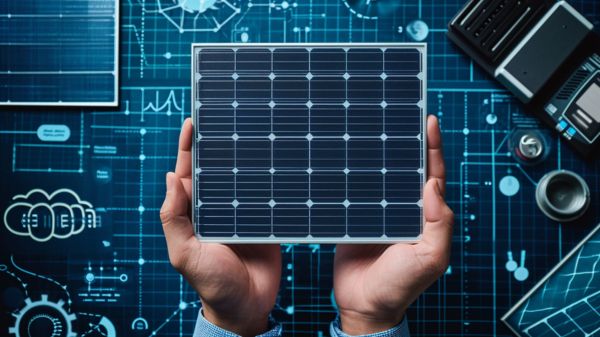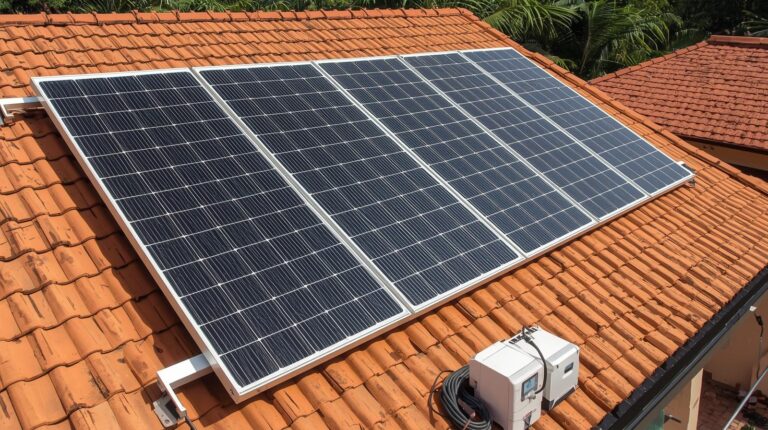Are you considering installing an off-grid solar system for your home? Imagine this scenario: you have been researching different options and are overwhelmed by the varying costs and components available. How do you make an informed decision?
Well, worry not, because we have compiled nine essential tips to help you compare off-grid solar system costs and find the best fit for your energy needs and budget.
Whether you’re a homeowner or a business owner, these tips will provide valuable insights and save you from making costly mistakes.
So, let’s dive in and discover the key factors to consider when comparing off-grid solar system costs.
Key Takeaways
- System size and capacity should be calculated based on energy needs to ensure sufficient electricity generation and storage.
- The type and quality of components, such as solar panels and inverters, can impact energy storage capacity and system performance.
- Labor and installation costs account for 10% of the overall cost, so hiring experienced installers and considering factors like complexity and location can influence costs.
- Regular maintenance and upkeep, including inspecting and cleaning solar panels, monitoring battery storage, and checking inverter condition, are important for optimal system performance and longevity.
System Size and Capacity
When considering an off-grid solar system, it’s crucial to carefully calculate the system size and capacity to ensure it meets the energy needs of your household or property. The system size and capacity determine the amount of electricity that can be generated and stored by the off-grid solar system. This is determined by the capacity of its components, such as solar panels, batteries, and inverters.
Larger off-grid systems with higher capacity are more expensive but provide greater energy independence and reliability. By understanding the system size and capacity, you can estimate the overall cost and performance of the off-grid solar system for your home.
It’s important to match the system’s capacity to your energy demands to ensure sufficient power supply.
Type of Components
Solar panels, solar batteries, inverters, and solar charge controllers are the key components that make up an off-grid solar system. These components play a crucial role in the overall performance and cost of the system.
Solar panels are responsible for converting sunlight into DC power, which is then stored in batteries for nighttime use.
Inverters are necessary to convert the DC power stored in the batteries into AC electricity, which can be used to power household appliances.
Solar charge controllers regulate the voltage and current from the solar array to the battery, ensuring that the battery is charged efficiently.
When comparing off-grid solar system costs, it’s important to consider the type and quality of these components, as they directly impact the system’s energy storage capacity, system performance, and overall installation costs.
Labor and Installation Costs
Labor and installation costs typically account for approximately 10% of the overall cost of an off-grid solar system. These costs are essential for ensuring the proper setup and wiring of the system components, such as solar panels, batteries, charge controllers, and inverters.
Hiring experienced and reputable solar installers is crucial to ensure efficiency and effectiveness during installation. The complexity and size of the off-grid system can impact the labor and installation costs, as more extensive systems may require additional time and resources for proper installation.
Factors like location, terrain, and accessibility can also influence these costs. Investing in professional installation not only optimizes performance and longevity but also provides peace of mind knowing that your off-grid solar system is in capable hands.
Maintenance and Upkeep
Regular maintenance is essential for ensuring the optimal performance and longevity of an off-grid solar system. To keep your system running smoothly, it’s important to regularly inspect and clean your solar panels. Dust, dirt, and debris can accumulate on the panels, reducing their efficiency.
Additionally, it’s crucial to monitor and maintain the condition of your battery storage. This includes checking charge levels, equalizing the batteries, and ensuring proper ventilation.
The inverter, which converts the DC energy from the solar panels into AC energy for use in your home, should also be regularly checked and maintained.
Inspecting the wiring and connections of your system is another important aspect of maintenance and upkeep. Securing and ensuring the integrity of these components will help prevent system failures.
If you’re unsure about how to properly maintain your off-grid solar system, don’t hesitate to seek professional assistance. They can provide valuable guidance and troubleshooting help, ensuring the longevity and reliability of your system.
Financing Options and Incentives
To ensure the optimal performance and longevity of your off-grid solar system, it’s important to explore the financing options and incentives available to help cover the costs. Here are some key considerations to keep in mind:
- Financing options: Solar loans, solar leases, and Power Purchase Agreements (PPAs) can provide financial assistance for your off-grid solar system. Each option has its own advantages and drawbacks, so it’s crucial to compare them carefully.
- Incentives: Owning the system qualifies you for solar incentives such as the federal solar tax credit, state tax credits, and property tax exemptions. Leased systems, however, don’t qualify for these incentives. Research the specific incentives available in your state, such as sales tax exemptions and cash rebates.
- Federal tax credit: The federal solar tax credit allows for a 26% reduction in total solar expense for residential systems in 2024. This can significantly lower the overall cost of your off-grid solar system.
- State-specific incentives: Different states offer various incentives that can further reduce the cost of your off-grid solar system. Make sure to research and understand the options available in your area.
Frequently Asked Questions
What Is the Average Cost of an Off-Grid Solar System?
The average cost of an off-grid solar system ranges from $45,000 to $65,000. Factors affecting costs include energy consumption, local sunshine conditions, and solar tax credits and incentives.
How Do You Compare Solar Systems?
When comparing solar systems, consider factors like energy output, reliability, and long-term savings. Evaluate components, warranties, installation costs, and financing options. Analyze return on investment and seek professional advice. Make an informed decision for your energy needs.
How Much Does a 10kw Solar System Cost?
A 10kW solar system installation can cost between $45,000 to $65,000. Factors like system type, local climate, and components influence the cost. Financing options, maintenance costs, and finding reputable installers are important considerations.
What Is the Best Cost Effective Solar System?
To find the best cost-effective solar system, consider affordable options, budget-friendly solutions, and cost-saving strategies. Look for value for money, economic viability, energy-efficient choices, and low-cost alternatives. Find sustainable and affordable options with a good return on investment and cost-effective solar panel options.
Conclusion
When comparing off-grid solar system costs, it’s crucial to consider factors such as system size, component types, labor costs, maintenance, and financing options.
By doing thorough research and obtaining estimates from multiple companies, you can make an informed decision.
Remember, as Benjamin Franklin once said, ‘An investment in knowledge pays the best interest.’
So, take the time to educate yourself and make the most cost-effective choice for your off-grid solar system.




